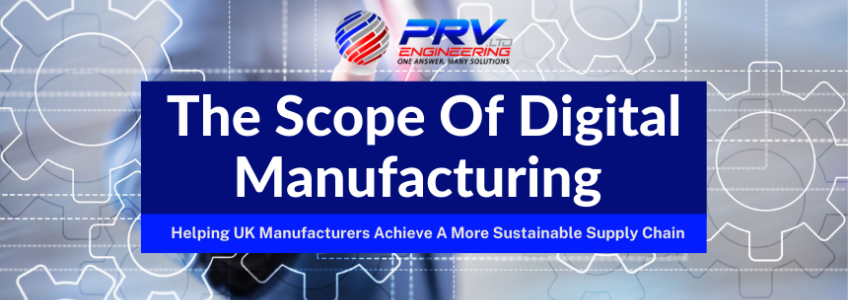The UK is set to benefit from a £53m investment by the government to build five new digital manufacturing research centres. The funding has been made possible through the national Made Smarter programme. This collaboration between the UK government and industry supports the development and use of emerging technologies. But what is digital manufacturing and how can companies use it to their advantage?
What Is Digital Manufacturing?
Digital manufacturing refers to the use of an integrated, computer-based system consisting of simulation, 3D visualisation, analytics and collaboration tools. Its goal is to create product and manufacturing process definitions simultaneously.
Put simply, digital manufacturing is when a company leverages digital technologies to benefit its operations. With digital manufacturing, they can create a connected, networked factory that fully integrates with the environment.
This enables them to use real-time data analytics to optimise the entire manufacturing process where productivity can increase by 10% to more than 1,000%. In addition to increased productivity, digital manufacturing has several benefits including the following:
- Eliminates bottlenecks
- Reduces inventory
- Improves quality
- Shortens time to market
- Pivots faster to meet customer needs
- Increases the number of products being manufactured
The Scope Of Digital Manufacturing
Digital manufacturing is essentially a 3D computer environment that is only possible due to the product and tooling data being available in 3D CAD. With advancing technologies, it has evolved recently and includes:
- Computer-aided process planning (CAPP)
- Computer-aided production engineering (CAPE)
- A manufacturing database containing product data, process data, manufacturing resources (PPR)
- Generation of executable programs for automation
- Generating instructions for workers on the shop floor and the feedback of manufacturing performance data
Helping UK Manufacturers Achieve A More Sustainable Supply Chain
The UK Government believes that adopting AI, blockchain, advanced robotics or smart machines in supply chains can help increase productivity and sustainability.
According to Lord Grimstone: “Improving productivity and becoming more competitive is not just about sophisticated manufacturing, but also about smarter manufacturing, and we want to make it as easy as possible for companies large and small to make the changes needed to take full advantage of the innovative technology being developed.”
Following the announcement, Saar Yoskovitz, CEO at Augury, said: “The government has rightly identified manufacturing, AI and advanced computing as some of the key industries for the UK to demonstrate R&D and industrial-strength globally. However, it’s vital that legacy businesses across these sectors benefit from the increased investment – not just newer start-ups.”
How (And Where) Is The Funding Being Used?
First up, £25m will go into five new industry-sponsored research centres set up at selected UK universities. Their goal is to accelerate the development of digital solutions that can transform manufacturing businesses.
Another £18m is available through the Digital Supply Chain Competition to 37 winning projects. This includes:
- Jaguar Land Rover investigating the use of blockchain technology when tanning leather to improve traceability.
- Armagh-based Food for Thought is also undertaking a project to improve the use of robotics and technology. They aim to increase food traceability and better use of cold storage infrastructure.
- SORT-IT by Durham-based Pragmatic Printing plans on using digital technology and intelligent automation to track and sort packaging waste for recycling
Lastly, £10m has been awarded to the new Made Smarter Innovation Digital Supply Chain Innovation Hub led by Digital Catapult to create fully connected, resilient and sustainable supply chains.
Where Will The New Digital Manufacturing Centres Be Located?
The Digital Medicines Manufacturing Research Centre will be based in Strathclyde, Cambridge and Loughborough Universities. Their goal is to create digital supply chains that enable medicines to be supplied on demand whilst enabling more flexible clinical trials.
A Research Centre for Smart, Collaborative Industrial Robotics will be in Loughborough, Strathclyde, Cranfield, Bristol and Warwick Universities. They will look at eliminating barriers to the adoption of robotics in manufacturing.
The Research Centre for Connected Factories will be based in Nottingham, Cambridge and Sheffield Universities. Their work involves creating a ‘Morphing Factory’ where production can be easily repurposed in response to changing market demand.
Sheffield, Cambridge and Loughborough Universities will have a Materials Made Smarter Research Centre. Here, the focus is on overcoming technological challenges that prevent adopting new materials and digital manufacturing processes to become more sustainable and help achieve net-zero emissions.
Lastly, People-Led Digitalisation will be at Bath, Nottingham and Loughborough Universities. Their objective is to achieve the highest level of manufacturing productivity by increasing the digital knowledge and awareness of manufacturers.
Final Thoughts
The UK is already among the top global manufacturers but is looking set on becoming a global leader in creating, adopting and exporting advanced digital technologies. If there was ever a time for the manufacturing sector to evolve, it is now especially with the endless possibilities of emerging technologies.
The future of UK manufacturing certainly has a positive outlook and this £53m investment further emphasises the government’s intent. These five new digital manufacturing research centres and projects announced by Lord Grimstone could just be the beginning of a new era.
For more interesting articles covering the latest in emerging technologies, engineering and manufacturing, please read our blog. You can also find us on social media and remember to use the hashtag #PRVtech.


Recent Comments